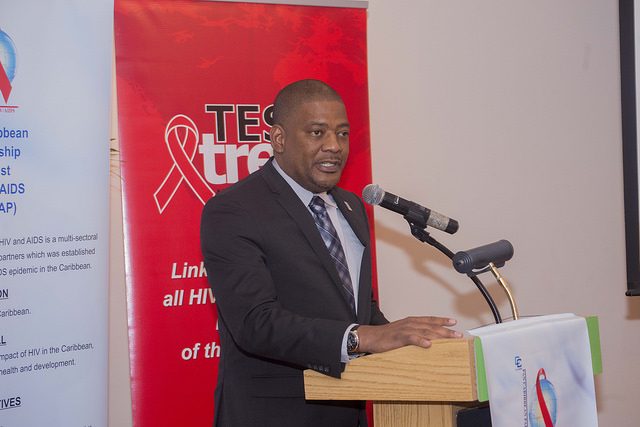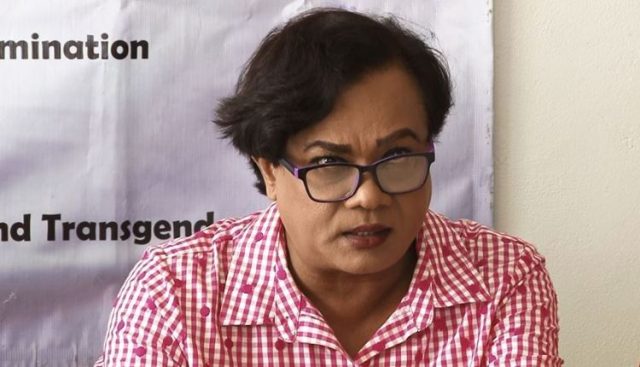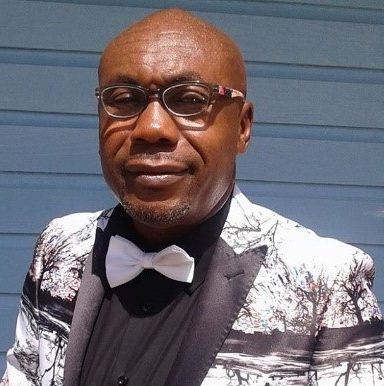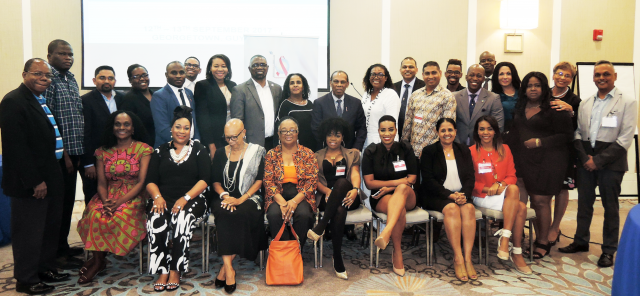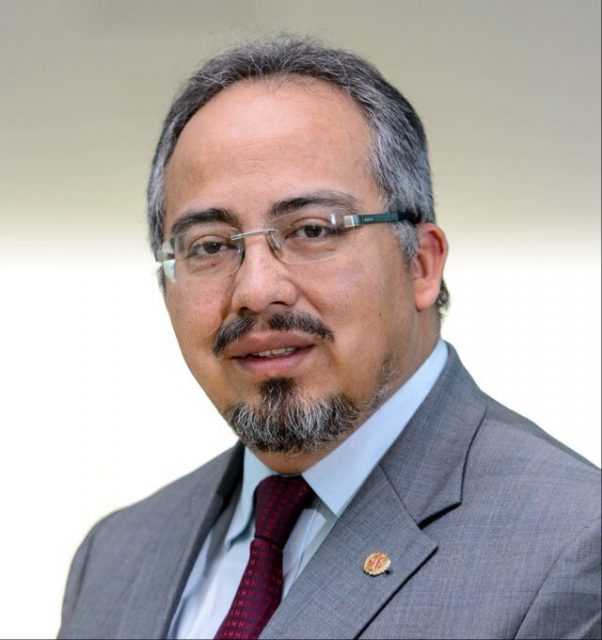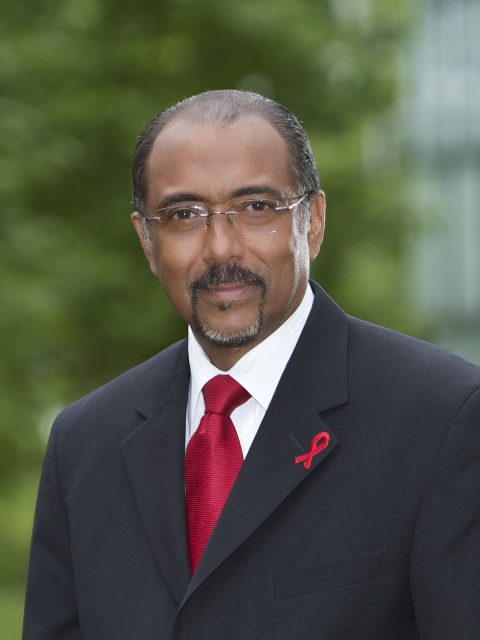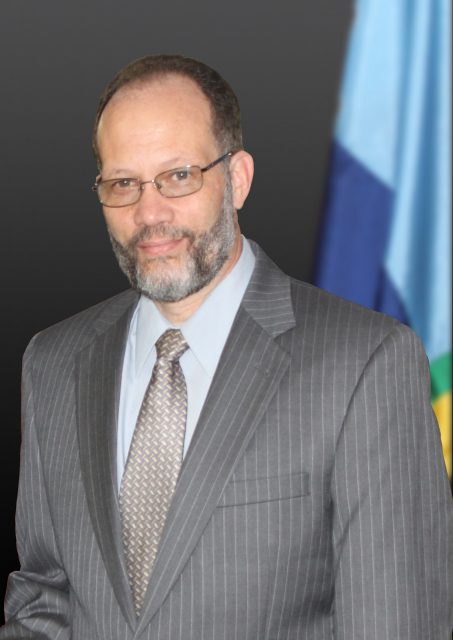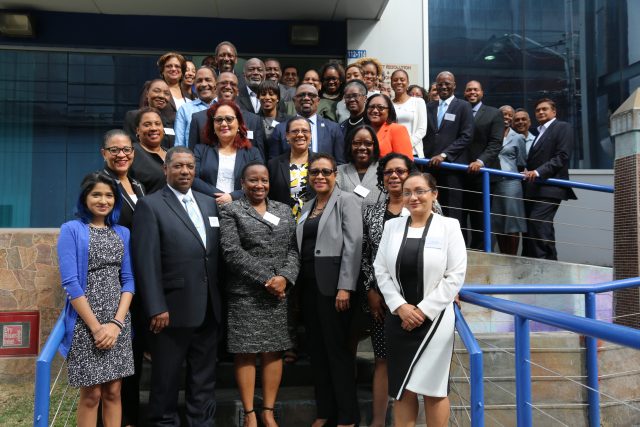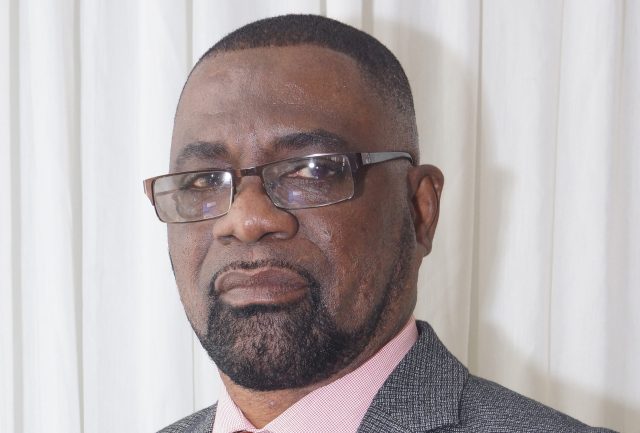Paramaribo, Suriname
Courtyard Marriott
February 7-9
Opening Remarks
Pan Caribbean Partnership against HIV and AIDS Dialogue between Regional Faith Leaders and Regional Key Population Leaders
His Excellency, Patrick Pengel, Minister of Public Health
Greetings to our Caribbean friends and colleagues. Welcome to Paramaribo, Suriname. Hope you will have a wonderful stay in Suriname.
The Government of Suriname is honored the PANCAP brought this Dialogue between Regional Faith Leaders and Regional Key Population Leaders to Suriname. Suriname is known for its peaceful co-existence of a multi-ethnic, multi-religious population. It is our pride and our benchmark and will prove to be a fertile environment for this dialogue.
This year the world will commemorate 35 years of HIV, 30 years of World AIDS Day, 20 plus years of life saving HIV combination anti-retroviral medicine, four years since the proclamation of the 90-90-90 targets, 2 years since the United Nations High Level Meeting and the proclamation of elimination of AIDS by 2030 and leaving no one behind.
Progress is being made in the world in the fight against HIV, 19.5 million people are reportedly now accessing anti-retroviral treatment, but there are still another 17 million people left to access treatment.
In Suriname there are 2400 persons on treatment, this is a 60% increase from 2014 and the gap of persons still needing treatment is expected to swiftly decline as Suriname as a country has officially committed to ‘Treat All’ on World AIDS Day 2017. However, there still remains a gap of more than 40% of persons living with HIV in Suriname that require access to treatment. In the Latin America- Caribbean Region 46% of persons living with HIV are successfully on treatment. At least another 40% of persons living with HIV will be added to this number before this gap is sufficiently bridged.
The Region is doing much better in eliminating Mother-to-Child Transmission. We applaud the six Caribbean countries that were validated for the elimination of mother-to-child transmission this past World AIDS Day. We applaud this achievement and are motivated to work towards our own validation.
But amidst these successes, we in Suriname, in the Caribbean, in the World know there are gaps that exist in access to treatment and prevention of HIV under Men having Sex with Men, Transgenders, Sex Workers, youth at risk, women, elders, and people who use drugs in our societies.
What is the gap we need to bridge in order to reach the 90-90-90 targets for all? Do we know where we stand in our communities specifically for those at higher risk? If you want to go fast go alone, but if you want to go far, as in 90-90-90 far, go with many – take your whole community along the journey, leave no one behind!
Do we know in each of our respective countries what the gaps are? Is everyone in our society involved in the journey towards 90-90-90? Are our communities well informed about HIV and AIDS? Do they know that it is always better to know than not know; as the Brazilians say “living better Knowing” and we in Suriname say “Sab I Libi, Tek a Test”
Do we know how to prevent ourselves from getting infected? But also, do we know how to live a healthy fulfilling life, if needed, with HIV? Do we know that a person on treatment who is undetectable, He/ She also is Un-infectious? Do our programs share this very important information with our population? Do share this important message to everyone; leave no one behind!
In Suriname like all other countries it takes daily commitment, improvement of health information systems, sharing these data and developing strategies with the involvement of all stakeholders to strengthen the health programs in general, and the HIV programs specifically.
In Suriname, we have been able to better analyze the continuum of care in key populations, due to linking data acquired during HIV prevention outreach in key population and linking those with our treatment database. We are convinced that the continuum of HIV care will be improved by practicing knowledge management and strategic alliances.
Humans are social beings
All children that are neglected, are withheld tender love and care, stop growing, stop reaching their developmental milestones. This is the same with adults, they may be deeply affected and not reach their God-given potential when not accepted or when rejected by their loved ones, by their friends and families, by their colleagues at work, by their churches, by society as a whole. Rejection on the bases of how one looks, dresses, acts in accordance or not with one’s biological sex creates and maintains inequity in our society.
The vision of the Ministry of Health is ‘Health for All’ also stated in our Surinamese constitution as the ‘Right to Health’ in line with WHO’s ‘Universal Access to Health’. Equity in health is a beacon which governments are working towards and governments know it will not be easy reaching these goals. Policies and laws designed to guarantee equity in life circumstances and in health do not always work as intended. Even when redress mechanisms are in place, stigma and discrimination often prevent victims from coming forward.
If stigma and discrimination are existing, their roots run deep. Too many persons rather suffer or die in pain than come forward and get help and treatment for HIV and AIDS because of the stigma, because of the discrimination.
Too many persons rather not know their status than come forward and have a fellow community member judge and reject them for the profession they do, the sexual preference they have, or maybe the age of their first sexual encounter. Too many persons don’t access care for these reasons. They are being left behind.
But nonetheless, key populations are part of our communities. They are our brothers, sisters, sons, daughters, colleagues, sport team members, our fellow churchgoers, our fellow human beings, they are us. The key populations are part of our communities. They are religious, they live, love, work, and contribute to our societies. We are aware of the challenges existing between religious teachings and non-alignment with certain behaviors. We are not here to deny that gap, to force alliance no matter what. But we do think compassion for all and the opportunity of consolation through religion is a basic human right. Religion is often a fundamental part of the life of human beings, certainly in our Caribbean Region. Even more so in those that are marginalized and ill. In illness, even non-religious persons often seek closure and healing in faith. Thus it is even more important to have faith leaders included in the discussion on the prevention and care of HIV. Even more important to have faith leaders informed about the facts and the myths in HIV care. Even more important to have faith leaders supporting messages that advocate for health.
The legislative environment
We are aware that key populations seeking redress often face barriers of exposure, stigma, and discrimination in the process. In practice, this amounts to that although having a health for all policy, as well as workplace policies that adhere to ILO conventions in place, as is the case in Suriname, there still is a need to have additional measure taken to have justice served. Human Rights Help desks could serve an additional purpose in this regard.
In practice, this will also amount to the need for collaborative partnerships among LGBTI representatives, parliamentarians, and Religious Leaders, as well as with other representatives of key populations to complement and to sustain the positive legislative environment.
The relationship between faith and governance
In Suriname, there is freedom of religion and religious expression. Different religious groups are co-existing peacefully side by side. There is a council consisting of representatives of the different religions present in Suriname. The religious council in Suriname, IRIS= Inter Religieuse Raad in Suriname, is an important organ for Faith Leaders in Suriname to voice opinions and views on all kinds of socially relevant issues. This council, IRIS- Inter Religieuse Raad in Suriname, is well respected, already often consulted on social issues, already a best practice of organized involvement of Faith Leaders in socially important matters and could serve as a stepping stone towards greater alliances with government and disadvantaged groups in our society to improve health for all.
The Dialogue
This PANCAP dialogue between Regional Key Population Leaders and Regional Faith Leaders to reduce stigma and discrimination for all and create a positive environment for partnerships between stakeholders in order to bridge gaps in universal access to health in general and gaps in HIV and AIDS health services in specific. This dialogue is applauded by the Government of Suriname.
Suriname applauds PANCAP and all partners involved for taking innovative actions to achieve Health for All, amounting to the fact that this consultation is already a success before it has even happened.
In conclusion, the Government of Suriname again wishes to emphasize how honored and proud we are for having been chosen as a hosting location for this Regional Dialogue. On behalf of the Government of Suriname, we wish all participants a fruitful consultation and we are convinced that at the end of this consultation we will have closer alliances between all stakeholders involved, ensuring we are leaving no one behind on our journey to 90-90-90, our journey to Health for All.
Wishing you again a Fruitful Meeting, a great stay in Suriname and looking forward to having more PANCAP regional activities in Suriname

